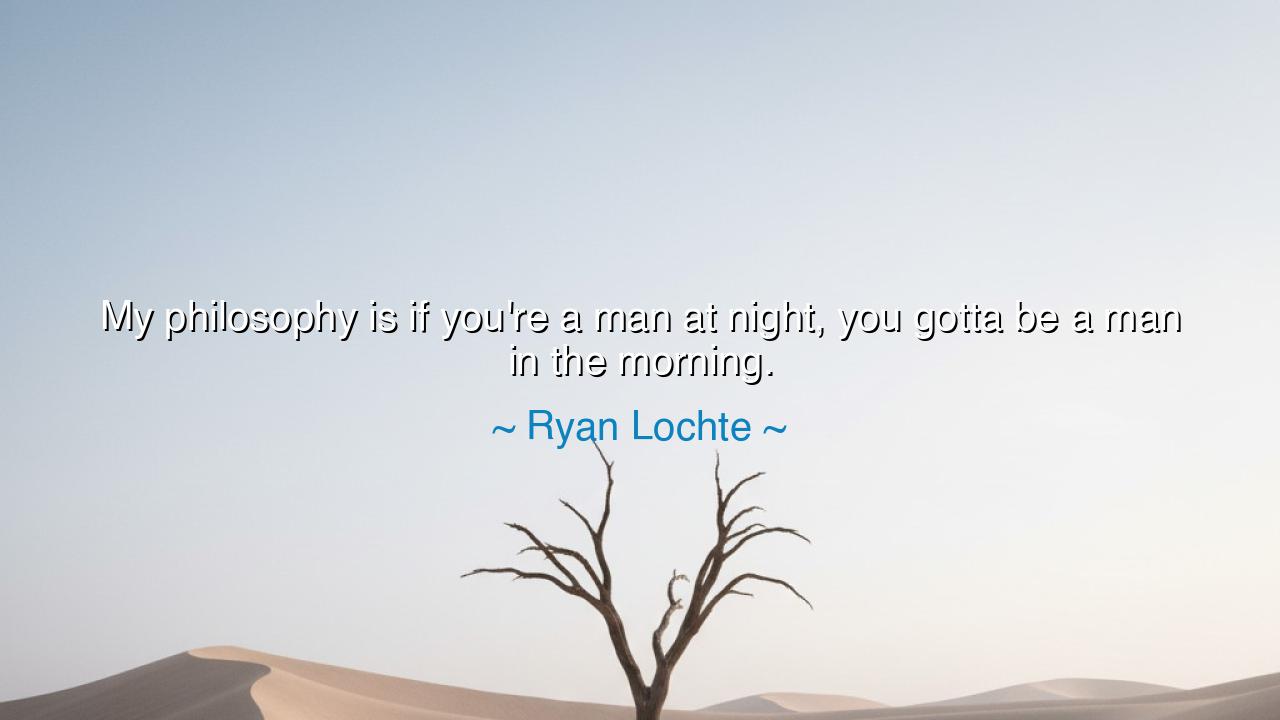
My philosophy is if you're a man at night, you gotta be a man in






Ryan Lochte, a man forged in the waters of competition, once declared with a blunt wisdom: “My philosophy is if you’re a man at night, you gotta be a man in the morning.” At first, his words strike with the simplicity of common sense, yet beneath them lies an eternal truth about responsibility, integrity, and the unchanging demand of consequences. It is easy to revel under the cloak of darkness, where choices feel free and unburdened. But the true measure of a man is not how he acts in the ease of night, but how he answers for it when the morning comes.
The night in Lochte’s words is symbolic — it is the realm of indulgence, of desire, of temptation, of freedom unrestrained. Many can act boldly in such hours, when the world is dim and the spirit seeks thrill. But when dawn breaks, when accountability rises with the sun, it is then that the true test comes. To be a man in the morning means to accept the weight of one’s choices, to rise from the softness of sleep and carry on with duty, no matter how heavy the head or weary the body.
History offers us countless examples of this truth. Consider Alexander the Great, who, even after nights of feasting and excess, still rose with the army at dawn, prepared to march into battle. His greatness was not in his indulgence, but in his ability to shoulder the burden of leadership when the morning demanded it. By contrast, many rulers throughout history fell because they embraced the pleasures of night but shrank from the responsibilities of morning — emperors who drowned in luxury and forgot the discipline that once made them mighty.
The philosophy Lochte proclaims is one of accountability. It says: do as you will, but be ready to own the cost. If you celebrate, then train. If you rest, then rise. If you err, then correct. This balance between freedom and responsibility is the essence of maturity, the bridge between youth’s recklessness and manhood’s strength. Without it, life becomes a cycle of escape, where nights of indulgence are followed by mornings of excuses.
There is also a lesson here about discipline. For the athlete, the student, the worker — every choice of night echoes into the morning. One cannot expect greatness if he feasts in darkness and fails to rise with the sun. Lochte’s creed reminds us that discipline is not the absence of pleasure, but the presence of follow-through. A man may celebrate, but he must also train. A man may rest, but he must also labor. Discipline is the harmony between desire and duty.
The lesson for all is this: live fully, but live responsibly. If you choose the joys of night, ensure you also meet the demands of morning. Do not seek escape from the consequences of your actions. Own them. Face them. Rise with them. For true character is forged not in what we do when the world is asleep, but in how we carry ourselves when the world is awake and watching.
Practical action follows: build habits that honor both sides of this truth. Celebrate, but do not overindulge. Rest, but rise early. If you make commitments, keep them, no matter what preceded them. Train your body and mind to accept the rhythm of consequence, so that when the morning comes, you stand firm and unashamed. In this way, your philosophy will not merely be spoken, but lived.
Thus, Ryan Lochte’s words become a torch of accountability, passed from athlete to every man and woman who seeks to live with honor. Children of tomorrow, remember this: the night may test your passions, but the morning will test your character. Be a man in both, and you will walk the earth with dignity unbroken.






AAdministratorAdministrator
Welcome, honored guests. Please leave a comment, we will respond soon